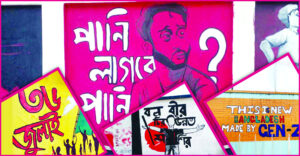Shahariar Islam Sovon
Joint News Editor, The New Nation:
The July Movement in Bangladesh this year is widely regarded as a notable success for Generation Z, a group often criticised for lacking significant contributions to world history. Typically defined as individuals born between 1997 and 2012, Generation Z is the first cohort to grow up with the internet and portable digital technology, earning them the title of “digital natives.” They are frequently characterised as future-oriented, pragmatic, and deeply valuing individual identity.

This generation’s identity has been shaped by the digital era, concerns over climate change, an evolving economic landscape, and the impact of the Covid-19 pandemic. In many countries, Generation Z is also more likely than older generations to be diagnosed with intellectual disabilities and psychiatric disorders. Often described as a restless, uncaring and unpredictable generation, they are said to favour “situationships” over relationships based on trust and long-term sustainability. They also tend to prioritise dialogue as the principal means of achieving change.
However, against all fame and blame, this generation in Bangladesh has shown that meaningful change may also require collective action and mass mobilisation. The July Movement exemplified this, as they successfully challenged and ousted a dictator who had held power for over 15 years. This moment of activism and resilience marked a defining chapter in the nation’s history.
Generation Z in Bangladesh first came into prominence in 2018 through two significant movements: the Quota Reform Movement and the Demand for Safe Roads. Despite their initial failure to achieve success, leading to a gradual fading from public attention, they have continued to influence the socio-political landscape in subtle ways.
This generation often prefers staying active on platforms like Facebook, exchanging views through social networks, and engaging in freelancing or cricket matches rather than pursuing sustainable career opportunities. Many face frustration arising from unemployment and the political instability in Bangladesh, which, in some cases, leads to issues such as drug addiction.

The economic repercussions of the COVID-19 pandemic have further compounded these challenges. While the immediate public health crisis was managed, the ensuing economic impacts have left a lasting impression. For Generation Z, these struggles intertwine with longstanding issues such as political instability, unemployment, and economic inequality. These conditions have prompted youth-led protests and movements demanding systemic change, underscoring their resilience and pivotal role in shaping the nation’s future.
The fear of joblessness has had a profound psychological impact on Bangladesh’s Generation Z. Many young people have shifted their aspirations from pursuing ideal careers to simply seeking financial stability. For some, even the idea of stable relationships has receded, giving rise to the concept of “situationships.” These arrangements, which occupy a middle ground between friendship and romantic commitment, reflect a pragmatic approach to relationships – a way to avoid long-term emotional and financial responsibilities in an uncertain world.
Bangladesh’s political landscape under Sheikh Hasina’s regime has been a significant source of discontent among Generation Z. Despite being the most connected and informed generation in the country’s history, many young people feel alienated from the political process. This alienation is partly due to limited opportunities to exercise political rights, widespread perceptions of systemic corruption, and the long deprivation of voting rights.
The rise of “situationships” among Bangladeshi Gen Z serves as a microcosm of their broader struggles. These relationships, devoid of long-term commitment or responsibility, mirror the precarious economic and social realities they face. With limited job prospects and an unpredictable political environment, many avoid traditional relationships, which they perceive as an additional source of stress in already challenging lives.
Economic injustice is another root cause of Generation Z’s frustration. Wealth and opportunities in Bangladesh are distributed unequally, with public service exams frequently criticised for corruption and nepotism. Such systemic barriers deny deserving candidates their rightful opportunities, perpetuating cycles of inequality.
For Generation Z, these injustices are not merely theoretical but lived realities. Many feel trapped in a system that offers few avenues for success, regardless of talent or effort. This frustration has fuelled protests and movements, with young people demanding transparency, accountability, and merit-based reforms.

The convergence of economic, social, and political struggles has galvanised Generation Z into action. Their fight against dictatorship and political oppression highlights their resilience and determination. Despite censorship, intimidation, and violence, they continue to organise and demand change. This youth-led struggle against authoritarianism is a defining feature of modern Bangladesh and reflects the broader experiences of Generation Z worldwide.



